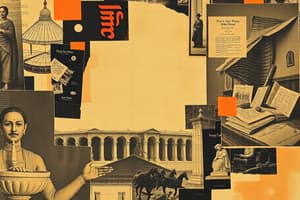Podcast
Questions and Answers
What is one of the key influences on Hindi literature mentioned in the text?
What is one of the key influences on Hindi literature mentioned in the text?
- Elizabethan era
- Vedic period (correct)
- Renaissance period
- World War I
Who were some of the prominent figures in the birth of modern Hindi literature?
Who were some of the prominent figures in the birth of modern Hindi literature?
- Bhartendu Harishchandra (correct)
- Leo Tolstoy
- William Shakespeare
- Pablo Picasso
What are the two epic narratives that heavily influence Hindi literature?
What are the two epic narratives that heavily influence Hindi literature?
- The Ramayana and The Mahabharata (correct)
- The Canterbury Tales and Beowulf
- The Iliad and The Odyssey
- The Divine Comedy and Paradise Lost
During which period did Hindi literature see its standardization?
During which period did Hindi literature see its standardization?
What aspect of Hindi literature continues to captivate readers and writers?
What aspect of Hindi literature continues to captivate readers and writers?
Who are some of the prominent poets associated with the bhakti movement in Hindi literature?
Who are some of the prominent poets associated with the bhakti movement in Hindi literature?
Which writer is known for using the feminine form of verbs to challenge societal norms in Hindi literature?
Which writer is known for using the feminine form of verbs to challenge societal norms in Hindi literature?
Who among the following writers is considered a master of the Hindi short story and often explored themes of partition and societal hypocrisy?
Who among the following writers is considered a master of the Hindi short story and often explored themes of partition and societal hypocrisy?
Which literary genre did Ramchandra Gandhi and Raghu Vira pave the way for in Hindi literature?
Which literary genre did Ramchandra Gandhi and Raghu Vira pave the way for in Hindi literature?
Which contemporary writer is known for pushing the boundaries of Hindi literature and exploring new themes and styles?
Which contemporary writer is known for pushing the boundaries of Hindi literature and exploring new themes and styles?
Flashcards are hidden until you start studying
Study Notes
Discovering the World of Hindi Literature
Hindi, one of the most widely spoken languages in the world, has a rich and diverse literary heritage. From timeless epics to modern prose, Hindi literature captivates us with a unique blend of artistry, philosophy, and expression that offers a window into the culture, history, and soul of India.
Origins and Evolution
Hindi literature traces its roots back to the Vedic period, where hymns and religious chants were recorded in the ancient languages of Sanskrit and Pali. As Hindi evolved, it absorbed influences from various regional dialects and languages, including Prakrit, Apabhramsha, and Avadhi, eventually leading to its standardization during the British rule of India.
The 19th century saw the birth of modern Hindi literature, marked by the works of luminaries such as Bhartendu Harishchandra, Keshav Chandra Sen, and Shridhar Narayan Mishra. Their contributions were pivotal to the development of Hindi as a literary language, laying the foundation for the genre's future growth.
Hindi Epics and Mythology
Hindi literature is heavily influenced by India's rich mythology, particularly the two epic narratives: the Ramayana and the Mahabharata. These epics, with their intricate plotlines, vivid characters, and philosophical underpinnings, continue to inspire and captivate readers and writers alike. The Mahabharata, often considered the greatest epic in the Sanskrit language, provides the basis for the Hindu epic poetry of the Hindi language, including the Adi Parva, Sabha Parva, and Bhagavad Gita.
Poetry
Hindi poetry encompasses a wide range of styles and themes, from the devotional bhakti poetry of the medieval period to the modern, experimental verse of the 20th and 21st centuries. The bhakti movement, which emerged in the 9th century, saw poets like Kabir, Surdas, and Tulsidas contributing to Hindi literature's spiritual and philosophical development.
In the 19th and 20th centuries, Hindi poetry experienced its golden age, with poets like Mahadevi Verma, Sumitranandan Pant, and Suryakant Tripathi writing works that continue to resonate with readers today. Mahadevi Verma's revolutionary use of the feminine form of the verbs in Hindi literature reflected a conscious effort to challenge patriarchal norms and question societal constructs of gender.
Prose
Hindi prose, from the 19th century onwards, has been characterized by a diverse array of genres, including the short story, the novel, and nonfiction writing. 19th-century writers like Munshi Premchand and Purshottam Das Tandon laid the groundwork for a rich tradition of Hindi fiction, while Ramchandra Gandhi and Raghu Vira paved the way for nonfiction writing.
The 20th century saw the emergence of several notable Hindi writers, including Vijaydan Detha, who wrote imaginative and engaging short stories in the regional dialects of Rajasthani, and Saadat Hasan Manto, the master of the Hindi short story, whose works often explored the themes of partition and societal hypocrisy.
Hindi Literature in Modern Times
Today, Hindi literature continues to thrive, with modern writers like Uday Prakash, Anita Nair, and Shankar Chaturvedi pushing the boundaries of the genre and exploring new themes and styles. The 21st century has also seen the emergence of graphic novels, such as Sarnath Banerjee's Corridor, which blend English and Hindi to tell stories that resonate with global audiences.
Conclusion
Hindi literature is a treasure trove of artistic expression and cultural heritage, offering readers a glimpse into the rich tapestry of India's history, society, and philosophy. From ancient epics to modern prose, Hindi literature boasts a diverse array of styles and themes that capture the imagination and inspire readers to explore the world through the lens of this beautiful language.
Studying That Suits You
Use AI to generate personalized quizzes and flashcards to suit your learning preferences.



